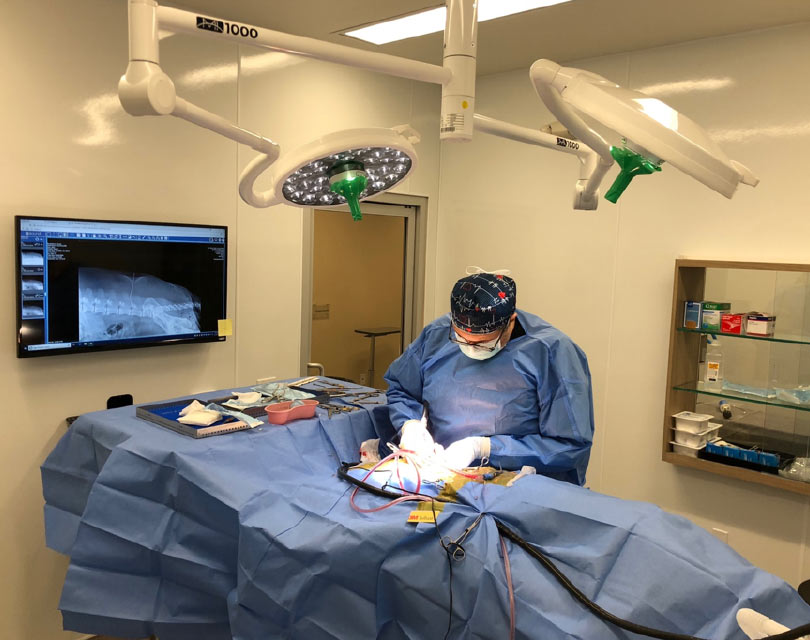Some neurological conditions require to be treated surgically. With proper diagnosis, thoughtful case selection, a neurosurgeon that is experienced and expert in the field, and proper post-operative care, the majority of the cases have a favorable outcome.

Signs of Epilepsy for Dogs and Cats
Epilepsy is described as episodes of seizures, but the way they manifest in each patient can be different. Certain animals may experience infrequent or unpredictable bouts of seizures while others may experience them in regular intervals. Signs that your pet is about to or is currently experiencing a seizure include:
- Collapsing
- Excessive drooling or foaming at the mouth
- Abnormal barking
- Incontinence
- Confusion
- Teeth grinding
- Stiffness in extremities
- Extreme shaking or tremors
- Vomiting
It’s important for pet owners to be able to identify seizures as they happen, so they can ease their pets’ pain and reduce the risk of an accident. Animals typically experience an epileptic episode in three phases.
- Aural phase: This phase can be detected by the signs of epilepsy listed above. Sometimes, the signs are subtle, like attention-seeking or restlessness, but it’s important to be hyper-aware of changes in your pet’s behavior regardless. Early detection can help ease or prevent the seizure to come.
- Ictal phase: The second phase is the actual seizure itself. It can be as short as a few seconds to several minutes. If this phase lasts over 5 minutes, this is an emergency that requires immediate veterinary attention.
- Postictal phase: After the seizure, the animal may be tired, confused, uncoordinated, or disoriented from the experience. In severe cases, they may lose certain senses and experience neurological abnormalities.
Epilepsy is a medical condition that is characterized by sudden, chronic seizures, which are a result of abnormal electrical impulses to the brain that lead to abrupt movements and behavior. It is a neurological disorder and each case can have a different cause. For most animals who are diagnosed with epilepsy, it’s a lifelong condition, but symptoms can be managed with the help of a veterinarian.
Causes of Epilepsy for Dogs and Cats
The cause of epilepsy can usually be attributed to one of the following: genetics, environmental factors, or health problems. Your veterinarian can determine why your pet is experiencing seizures with a series of blood tests, neurological examinations, and other diagnostics.
- Genetics: Certain breeds of dogs and cats may be more prone to having seizures than others. Like most other traits, their propensity to developing epilepsy is highly contingent on their parents. Symptoms of genetic epilepsy typically start to show between 10 months to 3 years of age.
- Environmental factors: There are environmental factors that can impair brain function and result in epilepsy. Toxins like harmful chemicals, pesticides, and foods can negatively affect your pet’s health. Prevent your pets from ingesting or breathing in poisonous substances by keeping your home pet-friendly and monitoring your pet’s activities.
- Health problems: Certain health issues can also affect the brain and result in epilepsy. Trauma to the head, liver disease, brain cancer, encephalitis, blood pressure, etc can all cause your pet to have seizures.
Types of Epilepsy
Once your veterinarian neurologist has determined the cause of epilepsy, they will be able to identify what type of epilepsy your pet has.
- Idiopathic Epilepsy: The vet will use tests to rule out possible causes and if there is no identifiable cause, then epilepsy will be categorized as idiopathic epilepsy. This type of epilepsy stem from a combination of genetic and environmental factors and it commonly affects young to middle-aged dogs.
- Structural Epilepsy: If the doctor can pinpoint the underlying cause of epilepsy to a specific abnormality in brain function, it is referred to as structural epilepsy. This can be caused by infection, trauma, tumors, and even degenerative brain diseases.
Reactive seizures are not technically epilepsies aren’t caused by a brain abnormality. Instead, they are linked to metabolic issues, such as low blood sugar, kidney failure, or liver failure, or certain stimuli.
Managing Epilepsy
There is no cure for epilepsy, but it can be managed to improve the quality of life for animals. The veterinarian can prescribe anticonvulsant drugs to reduce the frequency of seizures. Common medications for animals with epilepsy include phenobarbital, potassium bromide, levetiracetam, and rufinamide. These medications do have side effects, so check with your veterinarian if they are suitable for your pet.
The seizures that characterize epilepsy can be described as either generalized or focal. Generalized seizures affect both sides of the brain and body, resulting in involuntary muscle movements, impaired senses, salivation, or incontinence. Focal seizures, on the other hand, can be traced to a specific part of the brain, thus only affecting a specific part of the body. This types of seizure is typically displayed by facial twitches, paddling of limbs, behavioral changes, pupil dilation, or vomiting.
FAQ
What is epilepsy?
Epilepsy in Mission Viejo is a medical condition that causes the abnormal emission of electrical impulses across your pet’s neurological system, affecting their behavior and overall health. This condition is more generally characterized by sudden and chronic seizures, though there are many other symptoms associated with Epilepsy.
What animals are affected by epilepsy?
Epilepsy in Mission Viejo can, unfortunately, affect many species of animals, including household pets like cats and dogs. Because there are environmental causes of epilepsy, such as the intake of harmful chemicals, all animals are at risk of developing degenerative neurological conditions like Epilepsy.
What are the main causes of epilepsy?
We could classify epilepsy in Mission Viejo according to the following causes: genetic factors increase the probability that a pet whose parents suffered from epilepsy may also suffer from it, environmental factors such as poisonous chemicals in pesticides or cleaning materials, and health problems that result in the decay of a pet’s neurological system.
What other health problems can epilepsy cause?
Seizures characterize epilepsy in Mission Viejo, but your pet may also develop other symptoms that can be equally concerning. Incontinence, vomiting, teeth grinding, and disorientation are all symptoms you should care for.
What are the long term effects of epilepsy?
Unfortunately, we cannot fully reverse epilepsy in Mission Viejo. If this condition is left unattended, much harm may come to your pet. During episodes of seizures, or right before them, your pets may hurt themselves with the things around them, or fall from an elevated surface. Your pet can live a more comfortable life with proper veterinary care and medication.

